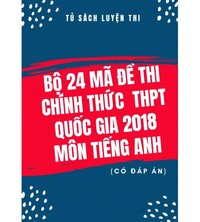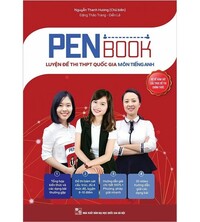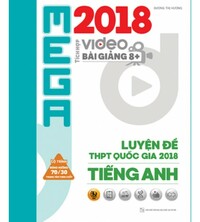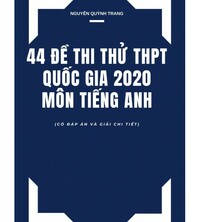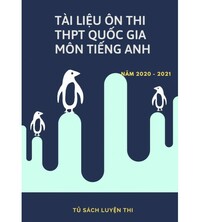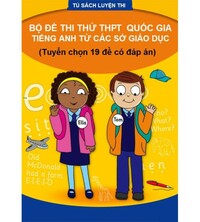Luyện thi Tiếng Anh THPT Quốc Gia
Bộ đề thi thử môn Tiếng Anh tốt nghiệp THPT Quốc Gia có đáp án và lời giải chi tiết dưới đây nằm trong bộ đề ôn thi THPT Quốc Gia 2019 do Tìm Đáp Án sưu tầm và đăng tải. Bộ đề thi Tiếng Anh gồm 15 đề kiểm tra Tiếng Anh khác nhau giúp học sinh lớp 12 ôn tập kiến thức đã học hiệu quả và rèn luyện những kỹ năng làm bài thi hữu ích.
Xem thêm: Đáp án Đề thi môn Tiếng Anh THPT Quốc gia năm 2019 HOT
Đề 1: Ôn thi THPT Quốc Gia môn Tiếng Anh năm học 2018 - 2019
SECTION A (8 points):
Mark the letter A, B, C, or D on your answer sheet to indicate the word whose underlined part is pronounced differently from that of the rest in each of the following questions.
Question 1: A. wicked B. watched C. stopped D. cooked
Question 2: A. head B. bread C. clean D. lead
Mark the letter A, B, C or D on your answer sheet to indicate the word that differs from the other three in the position of primary stress in each of the following questions.
Question 3: A. familiar B. impatient C. uncertain D. arrogant
Question 4: A. disappear B. arrangement C. opponent D. contractual
Mark the letter A, B, C, or D on your answer sheet to indicate the correct answer to each of the following questions.
Question 5: There is too much in this world.
A. greediness B. greed C.greedy D. greedness
Question 6: - "That's a very nice skirt you're wearing."
- “ ____________”
A. Howacompliment! B. That's all right.
C. It's nice of you tosayso. D. I like you said so.
Question 7: are the formal rules of correct or polite behavior among people using the Internet.
A. Trafficrules B. Family rules C. Codes of etiquettes D. Codes of netiquettes
Question 8: - " ______________"
- "Yes, of course. "
A. You won't help methistime. B. You'd better give me one hand.
C. I don't think I'll needyourhelp. D. Could you give me a hand?
Question 9: UNICEF supports and funds for the most disadvantaged children all over the world.
A. presents B.assists C. provides D. offers
Question 10: He would win the race if he his brother's example and trained harder.
A. repeated B. set C.answered D. followed
Question 11: "Excuse me. Where is the office of OXFAM located?"
A. leading B. head C.central D. summit
Question 12: The doctors know that it is very difficult to save the patient's life, they will try their best.
A. but B. although C. despite D. however
Question 13: I am sending you my curriculum vitae _____________ you will have a chance to study it before our interview.
A. sothat B. because C. for D. since
Question 14: Everybody in the house woke up when the burglar alarm .
A. went out B.went off C. came about D. rang off
Question 15: Have a piece of chocolate, ?
A. doyou B. would you C. don't you D. haven't you
Question 16: By the time you come here tomorrow, the work .
A. will havebeenfinishing B. will be finishing
C. will havebeenfinished D. will be finished
Question 17: If you put your money in a bank now, you may get 12%___________annually.
A. interest B.profit C. money D. income
Question 18: I can’t possibly lend you any more money, it is quite out of the .
A. order B.practice C. place D. question
Mark the letter A, B, C, or D on your answer sheet to indicate the word(s) CLOSEST in meaning to the underlined word(s) in each of the following questions.
Question 19: Such problems as haste and inexperience are a universal feature of youth.
A. marked B.separated C. shared D. hidden
Question 20: We have lived there for years and grown fond of the surroundings. That is why we do not want to leave.
A. loved the surroundings B. planted many trees in the surroundings
C. possessed bythesurroundings D. haunted by the surroundings
Mark the letter A, B C or D on your answer sheet to indicate the word(s) OPPOSITE in meaning to the underlined word(s) in each of the following questions.
Question 21: He is a typical optimist, always looking on the bright side of everything.
A. pessimist B. introvert C. extrovert D. activist
Question 22: When I was going shopping yesterday, I accidentally met one of my old friends in high school.
A. byfar B. byheart C. by chance D. on purpose
Read the following passage and mark the letter A, B, C or D on your answer sheet to indicate the correct answer for each of the blanks from 30 to 39.
The universal symbol of the Internet era communications, the @ sign used in e-mail addresses to signify the word 'at', is (23)___________ a 500-year-old invention of Italian merchants, a Rome academic has revealed. Giorgio Stabile, a science professor at La Sapienza University, claims to have stumbled on the earliest known example of the symbol's use, as a(n) (24) of a measure of weight or volume. He says the sign represents an amphora, a measure of capacity based on the terracotta jars used to transport grain and liquid in the ancient Mediterranean world.
The professor unearthed toe ancient symbol in the course of research for a visual history of the 20th century, to be published by the Treccani Encyclopedia. The first (25) instance of its use, he says, occurred in a letter written by a Florentine merchant on May 4, 1536. He says the sign made its way along trade routes to northern Europe, where it came to represent 'at the price of’, its contemporary accountancy meaning.
Professor Stabile believes that Italian banks may possess even earlier documents (26) the symbol lying forgotten in their archives. The oldest example could be of great value. It could be used (27)_____________ publicity purposes and to enhance the prestige of the institution that owned it, he says. The race is on between the mercantile world and the banking world to see who has the oldest documentation of @.
Question 23: A. actually B. truly C. essentially D. accurately
Question 24: A. proof B. sign C. evidence D. indication
Question 25: A. known B. knowing C. knowable D. knowledgeable
Question 26: A. taking B. carrying C. delivering D. bearing
Question 27: A. on B. for C. with D. by
Read the following passage and mark the letter A, B, C, or D on your answer sheet to indicate the correct answer to each of the questions from 40 to 49.
A rather surprising geographical feature of Antarctica is that a huge freshwater lake, one of the world's largest and deepest, lies hidden there under four kilometers of ice. Now known as Lake Vostok, this huge body of water is located under the ice block that comprises Antarctica. The lake is able to exist in its unfrozen state beneath this block of ice because its waters are warmed by geothermal heat from the earth's core. The thick glacier above Lake Vostok actually insulates it from the frigid temperatures on the surface.
The lake was first discovered in the 1970s while a research team was conducting an aerial survey of the area. Radio waves from the survey equipment penetrated the ice and revealed a body of water of indeterminate size. It was not until much more recently that data collected by satellite made scientists aware of the tremendous size of the lake; the satellite-borne radar detected an extremely flat region where the ice remains level because it is floating on the water of the lake.
The discovery of such a huge freshwater lake trapped under Antarctica is of interest to the scientific community because of the potential that the lake contains ancient microbes that have survived for thousands upon thousands of years, unaffected by factors such as nuclear fallout and elevated ultraviolet light that have affected organisms in more exposed areas. The downside of the discovery, however, lies in the difficulty of conducting research on the lake in such a harsh climate and in the problems associated with obtaining uncontaminated samples from the lake without actually exposing the lake to contamination. Scientists are looking for possible ways to accomplish this.
Question 28: What is true of Lake Vostok?
A. It iscompletelyfrozen. B. It is a saltwater lake.
C. It is beneath a thick slabofice. D. It is heated by the sun.
Question 29: All of the following are true about the 1970 survey of Antarctica EXCEPT that it .
A. was conductedbyair B. made use of radio waves
C. could not determine the lake'sexact size D. was controlled by asatellite
Question 30: It can be inferred from the passage that the ice would not be flat if .
A. there were nolakeunderneath B. the lake were not so big
C. Antarctica were notsocold D. radio waves were not used
Question 31: The word "microbes" in paragraph 3 could best be replaced by which of the following?
A. Piecesofdust B. Tiny bubbles C. Tiny organisms D. Rays of light
Question 32: Lake Vostok is potentially important to scientists because it ________________
A. can be studied usingradiowaves B. may contain uncontaminated microbes
C. may have elevated levels ofultravioletlight D. has already been contaminated
Question 33: The last paragraph suggests that scientists should be aware of _____________
A. further discoveries on the surface ofAntarctica
B. problems with satellite-borne radarequipment
C. ways to study Lake Vostok without contaminatingit
D. the harsh climate ofAntarctica
Question 34: The purpose of the passage is to .
A. explain how Lake Vostok wasdiscovered
B. provide satellite data concerningAntarctica
C. discuss future plans for LakeVostok
D. present an unexpected aspect of Antarctica'sgeography
Read the following passage and mark the letter A, B, C, or D on your answer sheet to indicate the correct answer to each of the questions from 50 to 59.
Perhaps the most striking quality of satiric literature is its freshness and its originality of perspective. Satire itself, however, rarely offers original ideas. Instead, it presents the familiar in a new form. Satirists do not offer the world new philosophies. What they do is look at familiar conditions from a perspective that makes these conditions seem foolish, harmful, or affected. Satire jars us out of complacence into a pleasantly shocked realization that many of the values we unquestioningly accept are false.
Don Quixote makes chivalry seem absurd; Brave New World ridicules the pretensions of science; A Modest Proposal dramatizes starvation by advocating cannibalism. None of these ideas is original. Chivalry was suspect before Cervantes, humanists objected to the claims of pure science before Aldous Huxley, and people were aware of famine before Swift.
It was not the originality of the idea that made these satires popular. It was the manner of expression, the satiric method, that made them interesting and entertaining. Satires are read because they are aesthetically satisfying works of art, not because they are morally wholesome or ethically instructive. They are stimulating and refreshing because with commonsense briskness they brush away illusions and secondhand opinions. With spontaneous irreverence, satire rearranges perspectives, scrambles familiar objects into incongruous juxtaposition, and speaks in a personal idiom instead of abstract platitude.
Satire exists because there is need for it. It has lived because readers appreciate a refreshing stimulus, an irreverent reminder that they live in a world of platitudinous thinking, cheap moralizing, and foolish philosophy. Satire serves to prod people into an awareness of truth, though rarely to any action on behalf of truth. Satire tends to remind people that much of what they see, hear, and read in popular media is sanctimonious, sentimental, and only partially true. Life resembles in only a slight degree the popular image of it.
Question 35: What does the passage mainly discuss?
A. Difficulties of writingsatiricliterature. B. Popular topics of satire.
C. New philosophies emerging fromsatiricliterature. D. Reasons for the popularity of satire.
Question 36: Don Quixote, Brave New World, and A Modest Proposal are cited by the author as .
A. classicsatiricworks B. a typical approach to satire
C. best satirists ofalltimes D. good critiques by satirists
Question 37: What satires fascinates readers is how .
A. ideas are expressed B. ideas are organized C. realistic they are D. plots are created
Question 38: Which of the following can be found in satiric literature?
A. Newlyemergingphilosophies. B. Odd combinations of objects and ideas.
C. Abstract discussion of moralsandethics. D. Wholesome characters who are unselfish.
Question 39: According to the passage, there is a need for satire because people need to be .
A. informed about new scientificdevelopments
B. exposed to original philosophies when they areformulated
C. reminded that popular ideas may often beinaccurate
D. told how they can be of service to theircommunities
Question 40: The word "refreshing" in the last paragraph is closest in meaning to .
A. popular B.revitalizing C. common D. awakening
Question 41: The word "sanctimonious" may be new to you. It most probably means " " in this context.
A. exaggerated B. good C.educational D. moderate
Question 42: The various purposes of satire include all of the following EXCEPT
A. introducing readers tounfamiliarsituations B. brushing away illusions
C. reminding readers ofthetruth D. exposing false values
Mark the letter A, B, C, or D on your answer sheet to show the underlined, part that needs correction.
Question 43: Please remain in your assign seats until the instructor dismisses the class.
A B C D
Question 44: Employees who haven't seen the new regulations often ask for unnecessary questions; instead
A B C
they should ask for a copy of the regulations and read them.
D
Question 45: The nutritionist told him to avoid eating lots of carbohydrates, focus having more protein-rich foods
A B C
and green vegetables, and drink at least eight glasses of water a day.
D
Mark the letter A, B, C, or D on your answer sheet to indicate the sentence that best combines each pair of sentences in the following questions.
Question 46: You don’t try to work hard. You will fail in the exam.
A. Unless you don’t try to work hard, you will fail in the exam.
B. Unless you try to work hard, you won’t fail in the exam.
C. Unless you try to work hard, you will fail in the exam.
D. Unless do you try to work hard, you will fail in the exam.
Question 47: Marry loved her stuffed animal when she was young. She couldn’t sleep without it.
A. When Marry was young, she loved her stuffed animal so as not to sleep with
B. As Marry couldn’t sleep without her stuffed animal when she was young, she loved
C. When Marry was young, she loved her stuffed animal so much that she couldn’t sleep without
D. When Marry was young, she loved her stuffed animal though she couldn’t sleep without
Mark the letter A, B, C, or D on your answer sheet to indicate the sentence that is closest in meaning to each of the following questions or indicate the correct answer to each of them.
Question 48: He decided not to go to university and went to work in a restaurant.
A. Despite of going to university he went to work in a restaurant
B. He went to work in a restaurant instead of going to restaurant.
C. Instead of going to university, he went to work in a
D. He decided to go to work in a restaurant because he liked
Question 49: The secret to success is hard work.
A. Working hardensuressuccess. B. If you keep your work secret, you will succeed.
B. One cannot succeed if hehassecrets. D. One must work hard to keep secrets.
Câu 50: Rather than disturb the meeting, I left without saying goodbye.
A. I disturbed the meeting because I said goodbye.
B. I would rather disturb the meeting than leave without saying goodbye.
C. The meeting was disturbed as I left saying goodbye.
D. I left without saying goodbye as I didn’t want to disturb the goodbye.
Đề 2
Mark the letter A, B, C, or D on your answer sheet to indicate the word whose underlined part is pronounced differently from that of the rest in each of the following questions.
Question 1: A. chorus B. Christian C. cholesterol D. check
Question 2: A. enough B. rough C. tough D. though
Mark the letter A, B, C or D on your answer sheet to indicate the word that differs from the other three in the position of primary stress in each of the following questions.
Question 3: A. ordinary B. emphasis C. decompose D. calendar
Question 4: A. comfortable B. necessary C. community D. memorable
Read the following passage and blacken the letter A, B, C, or D on your answer sheet to indicate the correct answer to each of the questions.
Scientists do not yet thoroughly understand just how the body of an individual becomes sensitive to a substance that is harmless or even wholesome for the average person. Milk, wheat, and egg, for example, rank among the most healthful and widely used foods. Yet these foods can cause persons sensitive to them to suffer greatly. At first, the body of the individual is not harmed by coming into contact with the substance. After a varying interval of time, usually longer than a few weeks, the body becomes sensitive to it, and an allergy has begun to develop. Sometimes it's hard to figure out if you have a food allergy, since it can show up so many different ways.
Your symptoms could be caused by many other problems. You may have rashes, hives, joint pains mimicking arthritis, headaches, irritability, or depression. The most common food allergies are to milk, eggs, seafood, wheat, nuts, seeds, chocolate, oranges, and tomatoes. Many of these allergies will not develop if these foods are not fed to an infant until her or his intestines mature at around seven months. Breast milk also tends to be protective. Migraines can be set off by foods containing tyramine, phenathylamine, monosodium glutamate, or sodium nitrate. Common foods which contain these are chocolate, aged cheeses, sour cream, red wine, pickled herring, chicken livers, avocados, ripe bananas, cured meats, many Oriental and prepared foods (read the labels!).
Some people have been successful in treating their migraines with supplements of B-vitamins, particularly B6 and niacin. Children who are hyperactive may benefit from eliminating food additives, especially colorings, and foods high in salicylates from their diets. A few of these are almonds, green peppers, peaches, tea, grapes. This is the diet made popular by Benjamin Feingold, who has written the book "Why your Child is Hyperactive". Other researchers have had mixed results when testing whether the diet is effective.
Question 19: The topic of this passage is
A. reactions to foods B. food and nutrition C. infants and allergies D. a good diet
Question 20: According to the passage, the difficulty in diagnosing allergies to foods is due to
A. the vast number of different foods we eat
B. lack of a proper treatment plan
C. the similarity of symptoms of the allergy to other problems
D. the use of prepared formula to feed babies
Question 21: The phrase "set off" in lines 11 is closest in meaning to
A. relieved B. identified C. avoided D. triggered
Question 22: What can be inferred about babies from this passage?
A. They can eat almost anything.
B. They should have a carefully restricted diet as infants.
C. They gain little benefit from being breast fed.
D. They may become hyperactive if fed solid food too early.
Question 23: The author states that the reason that infants need to avoid certain foods related to allergies has to do with the infant's
A. lack of teeth B. poor metabolism
C. underdeveloped intestinal tract D. inability to swallow solid foods
Question 24: The word "these" in line 16 refers to
A. food additives B. food colorings
C. innutritious foods D. foods high in silicates
Question 25: Which of the following was a suggested treatment for migraines in the passage?
A. Eating more ripe bananas B. Avoiding all Oriental foods
C. Getting plenty of sodium nitrate D. Using Vitamin B in addition to a good diet
Question 26: According to the article the Feingold diet is NOT
A. verified by researchers as being consistently effective
B. available in book form
C. beneficial for hyperactive children
D. designed to eliminate foods containing certain food additives
Read the following passage and blacken the letter A, B, C or D on your answer sheet to indicate the correct word for each of the blanks
How men first learnt to invent words is unknown; in other words, the origin of language is a (30). All we really know is that men, unlike animals, somehow invented certain sounds to express thoughts and feelings, actions and things so that they could communicate with each other; and that later they agreed (31) certain signs, called letters, which could be combined to represent those sounds, and which could be written down. These sounds, (32) spoken or written in letters, are called words. Great writers are those who not only have great thoughts but also express these thoughts in words that appeal powerfully to our minds and emotions. This charming and telling use of words is what we call literacy type. Above all, the real poet is a master of words. He can (33) his meanings in words which sing like music, and which by their position and association can move men to tears. We should, therefore, learn to choose our words carefully, (34) they will make our speech silly and vulgar.
| Question 30: A. story | B. secret | C. mystery | D. legend |
| Question 31: A. at | B. upon | C. with | D. to |
| Question 32: A. if | B. however | C. whether | D. though |
| Question 33: A. carry | B. convey | C. transfer | D. transmit |
| Question 34: A. or | B. so | C. although | D. because |
Mark the letter A, B, C, or D on your answer sheet to indicate the word(s) CLOSEST in meaning to the underlined word(s) in each of the following questions.
Question 35: If it's raining tomorrow, we'll have to postpone the match till Sunday.
A. put off B. cancel C. play D. put away
Question 36: We should find ways to improve our products in terms of quality and packaging.
A. for considering aspects B. in spite of C. with a view to D. in regard to
Mark the letter A, B, C, or D on your answer sheet to indicate the word(s) OPPOSITE in meaning to the underlined word(s) in each of the following questions.
Question 37: The government is encouraging everyone to save water by not washing their cars.
A. conserve B. waste C. avoid D. collect
Question 38: Don't tease her; she is fragile.
A. strong B. breakable C. angry D. pissed off
Read the following passage and blacken the letter A, B, C or D on your answer sheet to indicate the correct answer to each of the questions.
Until recently, hunting for treasure from shipwrecks was mostly fantasy; with recent technological advances, however, the search for sunken treasure has become more popular as a legitimate endeavor. This has caused a debate between those wanting to salvage the wrecks and those wanting to preserve them.
Treasure hunters are spurred on by the thought of finding caches of gold coins or other valuable objects on a sunken ship. One team of salvagers, for instance, searched the wreck of the RMS Republic, which sank outside the Boston harbor in 1900. The search party, using side-scan sonar, a device that projects sound waves across the ocean bottom and produces a profile of the sea floor, located the wreck in just two and a half days. Before the use of this new technology, such searches could take months or years. The team of divers searched the wreck for two months, finding silver tea services, crystal dinnerware, and thousands of bottles of wine, but they did not find the five and a half tons of American Gold Eagle coins they were searching for.
Preservationists focus on the historic value of a ship. They say that even if a shipwreck's treasure does not have a high monetary value, it can be an invaluable source of historic artifacts that are preserved in nearly mint condition. But once a salvage team has scoured a site, much of the archaeological value is lost. Maritime archaeologists who are preservationists worry that the success of salvagers will attract more treasure-hunting expeditions and thus threaten remaining undiscovered wrecks. Preservationists are lobbying their state lawmakers to legally restrict underwater searches and unregulated salvages. To counter their efforts, treasure hunters argue that without the lure of gold and million-dollar treasures, the wrecks and their historical artifacts would never be recovered at all.
Question 39: What is the main idea of this passage?
A. Searching for wrecks is much easier with new technologies like side-scan sonar.
B. Maritime archaeologists are concerned about the unregulated searching of wrecks.
C. The search of the RMS Republic failed to produce the hoped-for coins.
D. The popularity of treasure seeking has spurred a debate between preservationists and salvagers.
Question 40: The word "sunken" in line 2 is closest in meaning to which of the following words?
A. broken B. underwater C. ancient D. hollow
Question 41: Which of the following statements is best supported by the author?
A. The value of a shipwreck depends on the quantity of its artifacts.
B. Preservationists are fighting the use of technological advances such as side-scan sonar.
C. Side-scan sonar has helped to legitimize salvaging.
D. The use of sound waves is crucial to locating shipwrecks.
Question 42: The author uses the phrase "mint condition" in line 12-13 to describe
A. something perfect B. something significant
C. something tolerant D. something magical
Question 43: All of the following were found on the RMS Republic EXCEPT
A. wine bottles B. silver tea services
C. American Gold Eagle coins D. crystal dinnerware
Question 44: From the passage, you can infer that a preservationist would be most likely to
A. shun treasure-seeking salvagers B. be a diver
C. put treasures in a museum D. do archaeological research
Question 45: The second and third paragraphs are an example of
A. chronological order B. explanation
C. specific to general D. definition
Còn tiếp ...
Mời bạn đọc tải trọn bộ nội dung bộ đề thi và đáp án tại đây: 15 đề thi thử THPT Quốc gia môn Tiếng Anh có đáp án + giải thích chi tiết. Ngoài ra Tìm Đáp Án đã đăng tải rất nhiều tài liệu ôn thi THPT Quốc Gia môn Tiếng Anh năm 2019 khác như:
